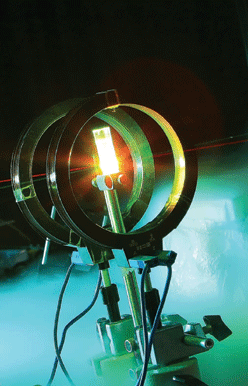Minor Introductions: Physics
 Physics is the study of nature at its most fundamental level. Historically, physics has been the root science for many other disciplines. A basic understanding of physics is deemed essential for all branches of science and engineering, and at Bilkent university such a basic introduction is provided to all science and engineering students through the freshmen physics courses PHYS 101 and PHYS 102. Starting this semester, Bilkent Physics Department is offering a minor program in physics for students who wish to go beyond the basic physics they have learned in freshmen year and learn some of the more modern topics in physics such as statistical physics or quantum mechanics.
Physics is the study of nature at its most fundamental level. Historically, physics has been the root science for many other disciplines. A basic understanding of physics is deemed essential for all branches of science and engineering, and at Bilkent university such a basic introduction is provided to all science and engineering students through the freshmen physics courses PHYS 101 and PHYS 102. Starting this semester, Bilkent Physics Department is offering a minor program in physics for students who wish to go beyond the basic physics they have learned in freshmen year and learn some of the more modern topics in physics such as statistical physics or quantum mechanics.
All the students applying to the physics minor program must complete the Physics 101 and Physics 102 courses successfully. The physics minor program consists of four mandatory and two elective courses. The four must courses are chosen to provide the student with a background in different subfields of physics and consist of Classical Mechanics I, Statistical Physics, Quantum Mechanics I, and Experimental Methods of Physics.
In Classical Mechanics I, the student is first introduced to some new mathematical techniques in the familiar confines of Newton's equations. Special theory of relativity is then developed based on these techniques, which serves as the first exposition of the student to modern physical concepts such as space-time and symmetries.
Statistical Physics is concerned with study of many particle systems where the student learns the connection between the microscopic world (such as molecule speed and positions) and macroscopic world (such as temperature and pressure). Quantum Mechanics I consists of the study of microscopic objects, where the student is forced to reconsider some of the basic concepts such as position and momentum and learns how this reconsideration leads to exciting and non-intuitive results such as teleportation and entanglement. In Experimental Methods of Physics the student will gain experience in laboratory techniques, such as using novel measurement tools and would also learn to analyze and interpret data.
The two elective courses in the physics minor program will be tailored to students' specific needs. For example, a student from electrical and electronics engineering may find it useful to take courses in condensed matter physics to learn how silicon microchips work, while a mathematics major may choose a course in group theory to learn how abstract concepts in mathematics are related to physical variables in quantum mechanics.
Once a student successfully completes the physics minor program, she/he would have gained a strong background in the main concepts that are usually found in a physics undergraduate program. Such a background would be extremely useful for students who would like pursue interdisciplinary research or branch out into new disciplines in their field.